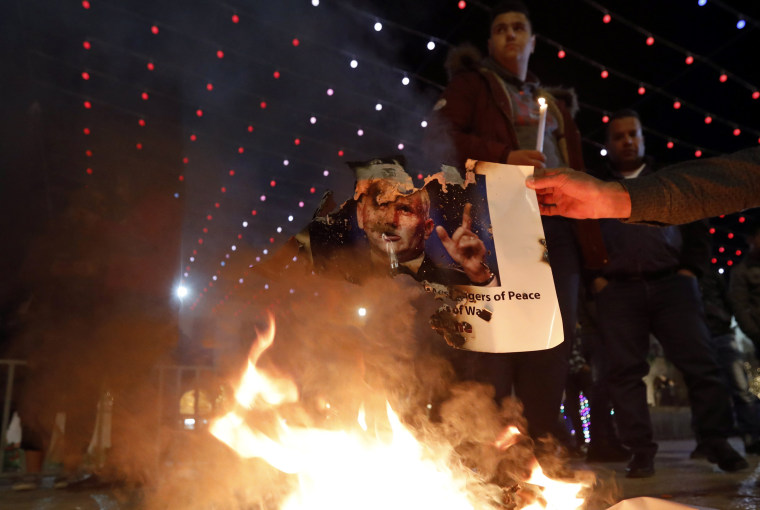Vice President Mike Pence's planned trip to Israel appears to have been postponed yet again, with the Israeli Foreign Ministry saying Tuesday that "it's not on our schedule."
Pence's deputy chief of staff, Jarrod Agen, had told The Associated Press on Monday that the vice president will be "going later this month," but didn't provide specific dates.
However, Israeli Foreign Ministry spokesman Emmanuel Nahshon later said that while the schedule could still change, no date had been confirmed for the visit.
Pence was originally scheduled to travel the week of Dec. 17, but the trip was then pushed to the week of Jan. 14 to enable him to be on hand for the Senate’s vote on tax reform.
President Donald Trump recognized Jerusalem as Israel's capital on Dec. 6, and said at the time that Pence would visit to "reaffirm our commitment" to America's "partners throughout the Middle East." The move upended decades of U.S. policy, sparked uproar among world leaders and triggered accusations that it jeopardized the prospects of Middle East peace.
Palestinians have sought East Jerusalem as the capital of a future independent state.
Following Trump’s Jerusalem announcement, Palestinian leaders said they would refuse to meet with Pence. Palestinian President Mahmoud Abbas' Fatah movement also called for protests.
Demonstrations followed and militants in Gaza have fired 18 rockets at Israel since Trump’s move, according to the Israeli Defense Forces. Some protesters have burned images of Pence.
Related: Why Trump’s Jerusalem move hasn’t sparked an intifada
Coming on the heels of Trump's announcement, a Pence trip is likely to stoke additional Palestinian anger, analysts told NBC News.
“Most Palestinians think that he’s coming to Israel to provoke the Palestinians — and the entire Muslim world which views Jerusalem as a holy place,” independent Palestinian analyst and researcher Naief Abo Sharkeia said before the trip was initially delayed. “The Americans know the Palestinian and Arab world feels this way, so why send a senior U.S. official now?”
Pence's deputy chief of staff said that when the trip is rescheduled the vice president will still go to Egypt, where he was previously scheduled to meet with President Abdel Fattah el-Sisi.
Pence's earlier itinerary included a speech to the Israeli Parliament as well as a visit the Western Wall, which is in the city’s sensitive eastern sector.
Such a visit would make it clear that the U.S. believes “already now that the Western Wall is part of Israel’s capital,” according to Ofer Zalzberg, a senior analyst on Israel and Palestine at the International Crisis Group, a think tank.
U.S. Ambassador David Friedman also visited the wall in mid-December. While there, Friedman lit the Hanukkah menorah and tweeted: “Some 2,180 years ago, the Maccabees reclaimed this very site and restored Jewish ritual to the Second Temple. Awed to stand on the same hallowed ground.”
Trump was the first sitting U.S. president to go to the Western Wall during his trip to the region in May.
The U.S. recognition of Jerusalem as Israel's capital, followed by the visit of U.S. officials to the Western Wall, has highlighted what Palestinians say is an imbalance in the U.S. relationship with the two sides, according to Abo Sharkeia, the analyst.
“Most people feel that the U.S. cannot be trusted in peace negotiations. You cannot be involved in peace process when you support one side and not the other,” he said.
Pence, a member of an evangelical movement that has traditionally been supportive of Israel, is a particularly divisive figure for the Palestinians. He was a supporter of Trump’s decision to recognize Jerusalem as Israel’s capital, and stood behind him during the announcement.
When the vice president announced his trip to the Middle East in the fall, he said one of its purposes was to "deliver the message that it is time to bring an end to the persecution of Christians."
However, Muslim and Christian leaders in Egypt and Israel have said they have no plans to meet with Pence during the trip in protest of the Jerusalem announcement.
Related: Abbas says U.N. should replace U.S. as Mideast mediator
Assuaging Palestinian anger will take more than time alone, analysts say.
“Realistically the only way for the U.S. to appear to be honest broker is to embed a major corrective in the peace plan it intends to publish,” Zalzberg said.
Recognizing East Jerusalem as the Palestinian capital or recognizing the state of Palestine would go a long way to earning back their trust, he added.
On Israel’s part, Pence’s visit is one more reason to celebrate.
At the start of a Cabinet meeting last month, Prime Minister Benjamin Netanyahu called Pence “a great friend" of Israel and Jerusalem.
Israel hopes that the U.S. move marks the beginning of international recognition of Jerusalem as its capital.
Guatemala has subsequently also announced plans to relocate its embassy to Jerusalem, and the Czech Republic said it is considering the move.
CORRECTION (Jan. 2, 2018, 11:10 a.m. ET): An earlier version of this article misspelled the last name of an analyst with the International Crisis Group. His name is Ofer Salzberg, not Salzburg.
